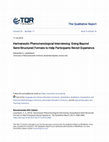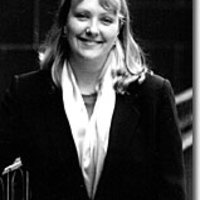Papers by Alexandra A Lauterbach

Inklusiver Unterricht konfrontiert Lehrpersonen mit neuen und komplexen Herausforderungen, zu der... more Inklusiver Unterricht konfrontiert Lehrpersonen mit neuen und komplexen Herausforderungen, zu deren Bewältigung positive Einstellungen und professionelle Kompetenzen zentrale Ressourcen darstellen. Vorliegende Erhebungsinstrumente zu ausgewählten Einstellungsaspekten sind mehrheitlich methodisch eindimensional konzipiert, handlungsleitendes Wissen und Kompetenzen werden nicht ausreichend berücksichtigt. Der Beitrag dokumentiert die Entwicklung und Validierung eines mixed-method Online-Fragebogens zur Erhebung der Einstellungen und Kompetenzen von Lehrkräften zur Inklusion. Zur Überprüfung der inhaltlichen Validität sowie der Testnebengütekriterien wurden kognitive Interviews mit 12 Lehrpersonen geführt und inhaltsanalytisch ausgewertet. Zur Reliabilitätsprüfung wurde das Instrument an einer Stichprobe von N = 77 Lehrpersonen pilotiert und statistisch analysiert. Die Ergebnisse belegen gute Reliabilitätskennwerte sowie eine inhaltlich valide, drei-dimensionale Faktorenstruktur. Die A...

As school counselors have adapted to changing policy and social structures, their beliefs, knowle... more As school counselors have adapted to changing policy and social structures, their beliefs, knowledge, and practices have evolved. Over the past two decades, a body of survey research has examined school counselors’ beliefs, knowledge, and practices, though no systematic review exists. In this review, we synthesize and evaluate survey research on the knowledge, beliefs, and practices relevant to the implementation of a standards-based comprehensive school counseling model in the United States. We identify the most salient findings, evaluate the research, identify the most rigorous studies, discuss their findings, and provide recommendations for future research. Considering the recent changes to how funding is distributed to states and schools within the Every Student Succeeds Act of 2015, such research is both timely and necessary to help clarify and increase the role school counselors play in helping schools achieve the goals of legislation.

The Qualitative Report, 2018
Phenomenological research traditionally involves multiple focused interviews that rely on the par... more Phenomenological research traditionally involves multiple focused interviews that rely on the participants’ memories and reflections to revisit experiences. There are many other interview formats that have the potential to support participants in this process by instead engaging with the phenomenon as it presents itself to their consciousness. In this paper, I present an example of how multiple interview formats, including think-aloud, stimulated recall, and semi-structured were used in a hermeneutic phenomenology study exploring expert teachers’ perceptions of teaching literacy within their content area to secondary students with learning disabilities. I provide example protocols in which I used multiple interview formats (i.e., think-aloud, stimulated recall, and semi-structured) to help participants engage with the phenomenon in ways that did not rely on memory and reflection alone. I describe how the data collected during different interview formats were analyzed using hermeneut...
American Journal of Qualitative Research, 2021
Best Practices for the Inclusive Classroom, 2021

Journal of Science Teacher Education, 2019
ABSTRACT Secondary students with learning disabilities are likely to learn science in an inclusiv... more ABSTRACT Secondary students with learning disabilities are likely to learn science in an inclusive classroom. Their success often depends on teachers’ ability to support their literacy needs. In this quasi-experimental study, we examine the effect of teacher’ involvement in intensive professional development designed to deepen secondary science teachers’ knowledge of evidence-based morphological awareness practices and implementation of evidence-based morphological awareness instruction, and to improve students’ science vocabulary knowledge. Teachers (n = 6) increased their knowledge of evidence-based morphological awareness practices and use of evidence-based morphological awareness instruction. Furthermore, their students’ (n = 55) knowledge of science vocabulary improved. We provide recommendations for future research, and discuss implications for the way districts and teacher educators design professional development and for improving the accessibility of science content.

Learning Disability Quarterly, 2019
Secondary content-area teachers seldom use research-based practices for students with learning di... more Secondary content-area teachers seldom use research-based practices for students with learning disabilities (LD), and prior research indicates they often conceptualize instruction in ways that align poorly with research about effective instruction for students with LD. However, prior research has focused on typical secondary content-area teachers, and we know little about how expert secondary content-area teachers think about instruction for students with LD. We used hermeneutic phenomenological methods to explore expert content-area teachers’ pedagogical schemas for teaching literacy to secondary students with LD. We found teachers’ pedagogical schemas were shaped by their goals for students and the role they believed learning difficulties played in achieving those goals. This led them to integrate literacy and disciplinary instruction to support students’ learning. The findings extend and support existing research on teachers’ expertise, and have implications for future efforts to...

Annals of dyslexia, Jan 15, 2016
This study aimed to (a) explore the roles of cognitive and language variables in predicting readi... more This study aimed to (a) explore the roles of cognitive and language variables in predicting reading abilities of two groups of individuals with reading disabilities (i.e., dyslexia and specific language impairment) and (b) examine which variable(s) is the most predictive in differentiating two groups. Inclusion/exclusion criteria applied to categorize the two groups yielded a total of 63 participants (n = 44 for the dyslexia; n = 19 for the specific language impairment). A stepwise multiple regression approach was conducted to examine which cognitive and/or language variables made the largest contribution to reading abilities (i.e., Phonetic Decoding Efficiency, Word Attack, Sight Word Efficiency, and Passage Comprehension). Results revealed that there were significant differences in which measures of cognitive and language ability predicted individuals with dyslexia and speech and language impairments reading ability, showing that the cognitive and language variables underlying the...

International Journal for the Advancement of Counselling, 2015
A grounded theory methodology was used to analyze articles and book chapters describing the devel... more A grounded theory methodology was used to analyze articles and book chapters describing the development and practice of school-based counseling in 25 different countries in order to identify the factors that affect development and practice. An 11-factor analytic framework was developed. Factors include: Cultural Factors, National Needs, Larger Societal Movements, Models of School Counseling, Laws and Educational Policy, Characteristics of the Public Education System, The Counseling Profession, Research and Evaluation, Related Professions, Community Organizations or NGO Coalitions, and Local Stakeholder Perceptions. The utility of this analytic framework in promoting understanding of the development and practice of school-based counseling in individual countries and in facilitating comparative analyses across countries is illustrated.
Handbook of Special Education Research, Volume I, 2022
TEACHING Exceptional Children, 2013

The majority of students with special needs or disabilities (SWDs) spend most of their school day... more The majority of students with special needs or disabilities (SWDs) spend most of their school days in general education classrooms (U. S. Department of Education, 2012). Successful inclusion of SWDs in general education classrooms is dependent, therefore, on both general and special education teachers’ knowledge, skills and collaboration (Brownell et al., 2012). Teachers, however, may hold different beliefs about how to support included students. SWDs may require more and different kinds of support than other students (Fuchs, Fuchs, & Compton, 2012); whether or not they get this support often depends on the individual teacher and, likely, the teacher’s beliefs (Jordan, Glenn & McGhie-Richmond, 2010). Because teachers’ beliefs about SWDs seem to have a strong influence on their actions in the classroom, they are important to understand (Borko & Putnam, 1996; Calderhead, 1996). The challenge in studying beliefs, however, is that they are complex. Teachers hold beliefs about curriculum...

Learning Disability Quarterly, 2014
ABSTRACT In this study, researchers operated from cognitive and situated perspectives to understa... more ABSTRACT In this study, researchers operated from cognitive and situated perspectives to understand how individual qualities and contextual factors influenced elementary special education teachers' learning in a multifaceted professional development (PD) project, Literacy Learning Cohort, focused on word study and fluency instruction. Grounded theory methodology was used to analyze qualitative interviews, cohort meetings, and classroom observations. Participants included five special educators who taught reading to students with disabilities in Grades 3 to 5. Results highlighted the central role of teachers' ability to analyze their current instructional practice in developing integrated knowledge of word study and fluency instruction and crafting more integrated instruction. Teachers' individual qualities, contextual factors, and PD components also worked in concert with teachers' propensity to analyze instruction and ultimately influenced teacher learning (i.e., degree of integrated knowledge and practice demonstrated). Implications of these findings for designing effective PD efforts are discussed.
Higher Education: Handbook of Theory and Research, 2016

Teacher Exceptional Children, 2014
Becoming an expert special educator is no easy task! Even if you have mastered the basic expectat... more Becoming an expert special educator is no easy task! Even if you have mastered the basic expectations for your job, those expectations are continually evolving, becoming increasingly complex and rigorous. Unfortunately, your efforts to develop the knowledge and skill to effectively meet these expectations and serve students with disabilities are probably not supported by the kinds of meaningful professional learning experiences that you need to grow. Fortunately, you do not have to rely on others to provide you with the knowledge and skills that you need to develop your capacity to effectively teach students with disabilities; you can take charge of your own professional learning. The purpose of this article is to support you in cultivating your own expertise. We first describe the context in which special educators are working, with increasingly complex demands and insufficient professional development opportunities. Next, we outline the knowledge, skills, and dispositions of effective special educators. Finally, we draw from research on the development of professional expertise to provide specific tips for taking charge of your own professional learning.
Teaching Exceptional Children, 2013
ABSTRACT Successful implementation of Response to Intervention frameworks in schools requires gen... more ABSTRACT Successful implementation of Response to Intervention frameworks in schools requires general and special education teachers to have well-integrated knowledge bases for providing instruction and intervention in reading and behavior. Implementation-focused approaches to changing teacher behavior, favored traditionally in special education, however, are unlikely to help teachers acquire such knowledge. In this chapter, we discuss the knowledge and practice that defines expert teachers in reading and behavior and how such expertise might be achieved through practice-focused approaches to initial teacher education and professional development.

Learning Disability Quarterly, 2014
In this study, researchers examined individual qualities and contextual factors that influenced e... more In this study, researchers examined individual qualities and contextual factors that influenced elementary special education teachers’ ability to apply what they learned in a multifaceted professional development (PD) project (i.e., Literacy Learning Cohort, LLC) focused on word study and fluency. Grounded theory methodology was employed to analyze qualitative interviews, cohort meetings, and classroom observations. The resulting grounded theory demonstrated that teachers’ ability to analyze their knowledge for teaching reading, students’ reading performance, curriculum, and strategies presented in the LLC influenced the degree to which they integrated LLC strategies into their classroom practice. In turn, the level of analysis demonstrated by the teachers depended on several individual teacher qualities, contextual factors, and the components of the LLC that they attended to most carefully. Results of this study suggest that researchers in this area must consider how individual teacher qualities, contextual factors, and PD opportunities interact if they are to develop efficacious PD efforts.

The majority of students with special needs or disabilities (SWDs) spend most of their school day... more The majority of students with special needs or disabilities (SWDs) spend most of their school days in general education classrooms (U. S. Department of Education, 2012). Successful inclusion of SWDs in general education classrooms is dependent, therefore, on both general and special education teachers’ knowledge, skills and collaboration (Brownell et al., 2012). Teachers, however, may hold different beliefs about how to support included students. SWDs may require more and different kinds of support than other students (Fuchs, Fuchs, & Compton, 2012); whether or not they get this support often depends on the individual teacher and, likely, the teacher’s beliefs (Jordan, Glenn & McGhie-Richmond, 2010).
Because teachers’ beliefs about SWDs seem to have a strong influence on their actions in the classroom, they are important to understand (Borko & Putnam, 1996; Calderhead, 1996). The challenge in studying beliefs, however, is that they are complex. Teachers hold beliefs about curriculum, the nature of content, students and what they bring to the classroom, their role in helping students, and their own efficacy in helping different types of students (Richardson, 1996). How these different sorts of beliefs are at work in the minds and actions of special and general education teachers is important to examine because teachers’ actions affect whether SWDs are able to progress successfully.











Uploads
Papers by Alexandra A Lauterbach
Because teachers’ beliefs about SWDs seem to have a strong influence on their actions in the classroom, they are important to understand (Borko & Putnam, 1996; Calderhead, 1996). The challenge in studying beliefs, however, is that they are complex. Teachers hold beliefs about curriculum, the nature of content, students and what they bring to the classroom, their role in helping students, and their own efficacy in helping different types of students (Richardson, 1996). How these different sorts of beliefs are at work in the minds and actions of special and general education teachers is important to examine because teachers’ actions affect whether SWDs are able to progress successfully.
Because teachers’ beliefs about SWDs seem to have a strong influence on their actions in the classroom, they are important to understand (Borko & Putnam, 1996; Calderhead, 1996). The challenge in studying beliefs, however, is that they are complex. Teachers hold beliefs about curriculum, the nature of content, students and what they bring to the classroom, their role in helping students, and their own efficacy in helping different types of students (Richardson, 1996). How these different sorts of beliefs are at work in the minds and actions of special and general education teachers is important to examine because teachers’ actions affect whether SWDs are able to progress successfully.